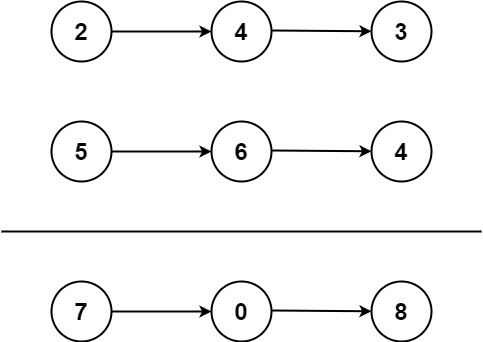LeetCode in Erlang
2. Add Two Numbers
Medium
You are given two non-empty linked lists representing two non-negative integers. The digits are stored in reverse order, and each of their nodes contains a single digit. Add the two numbers and return the sum as a linked list.
You may assume the two numbers do not contain any leading zero, except the number 0 itself.
Example 1:

Input: l1 = [2,4,3], l2 = [5,6,4]
Output: [7,0,8]
Explanation: 342 + 465 = 807.
Example 2:
Input: l1 = [0], l2 = [0]
Output: [0]
Example 3:
Input: l1 = [9,9,9,9,9,9,9], l2 = [9,9,9,9]
Output: [8,9,9,9,0,0,0,1]
Constraints:
- The number of nodes in each linked list is in the range
[1, 100]. 0 <= Node.val <= 9- It is guaranteed that the list represents a number that does not have leading zeros.
Solution
%% Definition for singly-linked list.
%%
%% -record(list_node, {val = 0 :: integer(),
%% next = null :: 'null' | #list_node{}}).
-spec add_two_numbers(L1 :: #list_node{} | null, L2 :: #list_node{} | null) -> #list_node{} | null.
add_two_numbers(L1, L2) ->
{Result, _} = add_two_numbers(L1, L2, 0),
Result.
-spec add_two_numbers(L1 :: #list_node{} | null, L2 :: #list_node{} | null, Carry :: integer()) -> {#list_node{} | null, integer()}.
add_two_numbers(null, null, 0) ->
{null, 0};
add_two_numbers(L1, L2, Carry) ->
X = if L1 =/= null -> L1#list_node.val; true -> 0 end,
Y = if L2 =/= null -> L2#list_node.val; true -> 0 end,
Sum = Carry + X + Y,
NewCarry = Sum div 10,
NewNode = #list_node{val = Sum rem 10},
{Next1, _} = if L1 =/= null -> {L1#list_node.next, 0}; true -> {null, 0} end,
{Next2, _} = if L2 =/= null -> {L2#list_node.next, 0}; true -> {null, 0} end,
{NextResult, _} = add_two_numbers(Next1, Next2, NewCarry),
{NewNode#list_node{next = NextResult}, NewCarry}.

